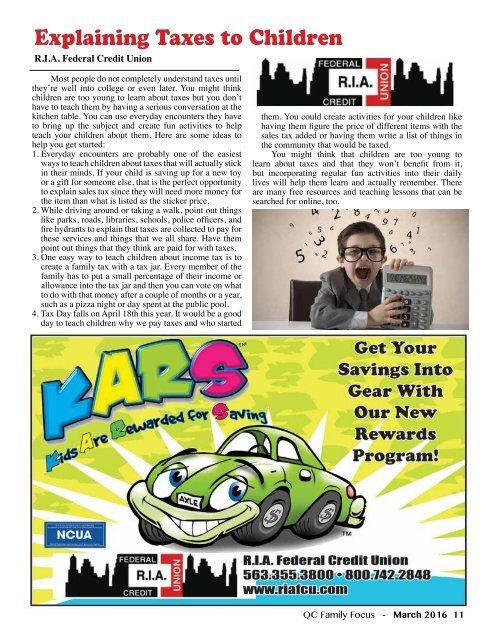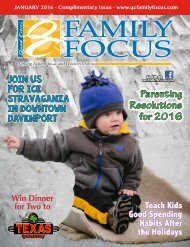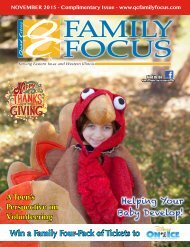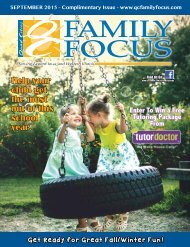QC Family Focus: March 2016
In this issue: Explaining Taxes to Children; What Kids Should Know Before Entering Kindergarten; A Checklist for First-Time Home Buyers; Promoting Healthy Dating Among Teens and Young Adults; Aging and Hearing Loss
In this issue: Explaining Taxes to Children; What Kids Should Know Before Entering Kindergarten; A Checklist for First-Time Home Buyers; Promoting Healthy Dating Among Teens and Young Adults; Aging and Hearing Loss
Create successful ePaper yourself
Turn your PDF publications into a flip-book with our unique Google optimized e-Paper software.
Explaining Taxes to Children<br />
R.I.A. Federal Credit Union<br />
Most people do not completely understand taxes until<br />
they’re well into college or even later. You might think<br />
children are too young to learn about taxes but you don’t<br />
have to teach them by having a serious conversation at the<br />
kitchen table. You can use everyday encounters they have<br />
to bring up the subject and create fun activities to help<br />
teach your children about them. Here are some ideas to<br />
help you get started:<br />
1. Everyday encounters are probably one of the easiest<br />
ways to teach children about taxes that will actually stick<br />
in their minds. If your child is saving up for a new toy<br />
or a gift for someone else, that is the perfect opportunity<br />
to explain sales tax since they will need more money for<br />
the item than what is listed as the sticker price.<br />
2. While driving around or taking a walk, point out things<br />
like parks, roads, libraries, schools, police officers, and<br />
fire hydrants to explain that taxes are collected to pay for<br />
these services and things that we all share. Have them<br />
point out things that they think are paid for with taxes.<br />
3. One easy way to teach children about income tax is to<br />
create a family tax with a tax jar. Every member of the<br />
family has to put a small percentage of their income or<br />
allowance into the tax jar and then you can vote on what<br />
to do with that money after a couple of months or a year,<br />
such as a pizza night or day spent at the public pool.<br />
4. Tax Day falls on April 18th this year. It would be a good<br />
day to teach children why we pay taxes and who started<br />
them. You could create activities for your children like<br />
having them figure the price of different items with the<br />
sales tax added or having them write a list of things in<br />
the community that would be taxed.<br />
You might think that children are too young to<br />
learn about taxes and that they won’t benefit from it,<br />
but incorporating regular fun activities into their daily<br />
lives will help them learn and actually remember. There<br />
are many free resources and teaching lessons that can be<br />
searched for online, too.<br />
<strong>QC</strong> <strong>Family</strong> <strong>Focus</strong> - <strong>March</strong> <strong>2016</strong> 11
















